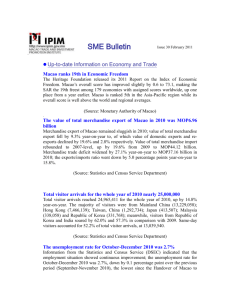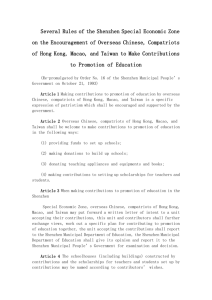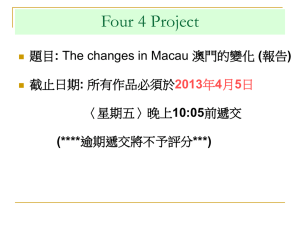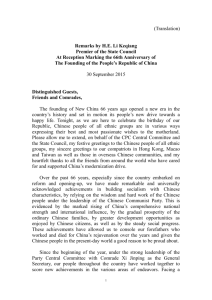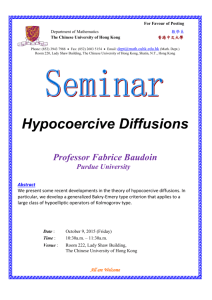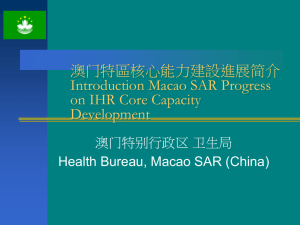On the Fundamental Characteristics of the “One Country, Two
advertisement
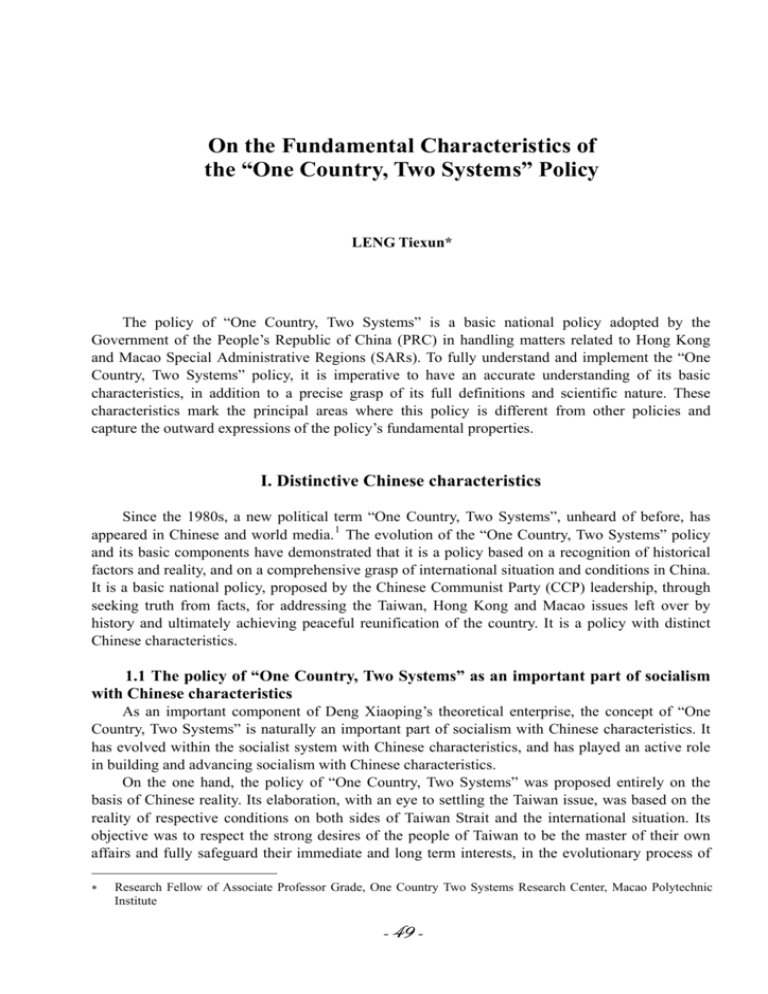
On the Fundamental Characteristics of the “One Country, Two Systems” Policy LENG Tiexun* The policy of “One Country, Two Systems” is a basic national policy adopted by the Government of the People’s Republic of China (PRC) in handling matters related to Hong Kong and Macao Special Administrative Regions (SARs). To fully understand and implement the “One Country, Two Systems” policy, it is imperative to have an accurate understanding of its basic characteristics, in addition to a precise grasp of its full definitions and scientific nature. These characteristics mark the principal areas where this policy is different from other policies and capture the outward expressions of the policy’s fundamental properties. I. Distinctive Chinese characteristics Since the 1980s, a new political term “One Country, Two Systems”, unheard of before, has appeared in Chinese and world media. 1 The evolution of the “One Country, Two Systems” policy and its basic components have demonstrated that it is a policy based on a recognition of historical factors and reality, and on a comprehensive grasp of international situation and conditions in China. It is a basic national policy, proposed by the Chinese Communist Party (CCP) leadership, through seeking truth from facts, for addressing the Taiwan, Hong Kong and Macao issues left over by history and ultimately achieving peaceful reunification of the country. It is a policy with distinct Chinese characteristics. 1.1 The policy of “One Country, Two Systems” as an important part of socialism with Chinese characteristics As an important component of Deng Xiaoping’s theoretical enterprise, the concept of “One Country, Two Systems” is naturally an important part of socialism with Chinese characteristics. It has evolved within the socialist system with Chinese characteristics, and has played an active role in building and advancing socialism with Chinese characteristics. On the one hand, the policy of “One Country, Two Systems” was proposed entirely on the basis of Chinese reality. Its elaboration, with an eye to settling the Taiwan issue, was based on the reality of respective conditions on both sides of Taiwan Strait and the international situation. Its objective was to respect the strong desires of the people of Taiwan to be the master of their own affairs and fully safeguard their immediate and long term interests, in the evolutionary process of ∗ Research Fellow of Associate Professor Grade, One Country Two Systems Research Center, Macao Polytechnic Institute @ GL @ Academic Journal of “One Country, Two Systems” Vol. I national reunification. It was based on such pragmatic considerations that Deng Xiaoping unequivocally proposed that Taiwan could maintain its existing capitalist system and way of life after reunification and that this approach could also be applied in resolving the Hong Kong and Macao issues. On the other hand, the policy of “One Country, Two Systems” is also conducive to development of China under socialism with Chinese characteristics. For the Chinese mainland, with the concept of “One Country, Two Systems” gradually becoming a reality, a peaceful and stable environment could be created for reform, opening up and modernization. At the same time, the Mainland could also have better framework to learn and adopt advanced management practices from Hong Kong, Macao and Taiwan. Further, with peaceful reunification being achieved through the “One Country, Two Systems” approach, Taiwan, Hong Kong and Macao could also benefit greatly in both political and economic areas. The smooth return of Hong Kong and Macao to China and their development since have amply proved this point. If the Taiwan authorities could accept and adopt the “One Country, Two Systems” concept, the overall strength of the Chinese nation will be greatly enhanced and the Chinese nation will project an entirely new image among nations of the world. 1.2 The “One Country, Two Systems” approach maintains national unity The policy “One Country, Two Systems” contains multiple components, but its core concern is national unity for the following reasons: 1.2.1 A fundamental national interest. Taiwan, Hong Kong and Macao issues are all of historical origins, which impaired China’s sovereignty and territorial integrity. Reunification is the essence in efforts for the settlement of Taiwan, Hong Kong and Macao issues and an inevitable policy choice in the interest of safeguarding national sovereignty and territorial integrity. Taiwan, Hong Kong and Macao must be reunified with the motherland and there is no room for compromise. The primary position held unwaveringly is the sanctity of national sovereignty. 1.2.2 Nationalist sentiments. On the sentiments for the reunification of Chinese nation, Deng Xiaoping once commented in his reply to the question “What is in it for Taiwan to be reunified with the mainland?” by the United States newsman Mike Wallace during an interview on 2nd September 1986, “First of all, it is a national question, a question of national sentiment. All members of the Chinese nation want to see China reunified. The present state of division is contrary to our national will.” 2 The national sentiment and the people’s common desire are the reason why the Chinese government firmly pushes forward with the tremendous efforts for national reunification and proposed the innovative notion of “One Country, Two Systems”. 1.2.3 National revival. Due to historical reasons, China’s sacred territories of Taiwan, Hong Kong and Macao were not returned to the motherland by the 1980s. Ending this situation of partition at the earliest possible time and achieving complete national reunification and territorial integrity is a common aspiration shared by all Chinese people, including Hong Kong, Macao and Taiwan compatriots and overseas Chinese around the world. This will also be a foundation for the great rejuvenation of Chinese nation. Only by achieving complete national reunification, can China completely eliminate underlying threat to national sovereignty and territorial integrity, truly unite the Chinese nation as a whole, create national glory, truly safeguard national independence and not be subjected to actions and will of others. Only then can the Chinese nation completely redress the shame and humiliation inflicted on her for more than a century after 1840 and stand proud among @ HC @ LENG Tiexun, 49-59 nations of the world. The “One Country, Two Systems” policy in its entirety is consistent with the principle of national unity. The Basic Laws of the Hong Kong SAR and the Macao SAR both stated at the outset in the preamble that upholding national unity and territorial integrity, maintaining the prosperity and stability of Hong Kong and Macao, the PRC has decided that SARs for Hong Kong and Macao will be established and that under the principle of “One Country, Two Systems”, the socialist system and policies will not be practised in Hong Kong and Macao. Specific provisions throughout the Basic Laws all reflect the principle of safeguarding national sovereignty and national unity. 1.3 The “One Country, Two Systems” policy is a fundamental national strategy for peaceful reunification According to the “One Country, Two Systems” policy, upon resumption of exercise of sovereignty over Hong Kong and Macao, the national unity shall be maintained through peaceful coexistence of the socialist system on the mainland and capitalist system in Hong Kong and Macao. Moreover, such a principle of peaceful reunification has been designated as a fundamental national strategy, with its implementation ensured by constitutional and legal protection. There is no parallel to this approach elsewhere in the world today. The fact that the “One Country, Two Systems” policy is established as a fundamental national strategy means it is not a policy of expediency and will not be subject to random changes. The provisions for Hong Kong and Macao to retain their existing capitalist system and way of life for 50 years upon return to China are enshrined in both the Basic Law of the Hong Kong SAR and the Basic Law of the Macao SAR. In fact, the Basic Law provisions of “remain unchanged for 50 years” is a statement of national policy in a figurative manner, the essence of which is that the policy and principle are not of expedient design and temporary nature, but rather are part of the national policy framework. As a fundamental national strategy, it shall remain stable and unchanged over the long term. II. The innovative nature of the policy The concept of “One Country, Two Systems” is truly a masterpiece of innovative political thinking, accommodating capitalist system within a unified country under socialist system, with a pledge of not changing this structure over the long term. 2.1 The “One Country, Two Systems” is a breakthrough to traditional theory of the state Since emergence of the nation-state, traditional national forms have been based on “One Country, One System”, i.e. only one socio-political system is enshrined in the constitution of one country. Therefore, the “One Country, Two Systems” concept is “unprecedented” 3 in that it allows two socio-political systems of entirely different nature to co-exist within a unified sovereign state over the long term. The concept basically extends the “adoption of capitalism” to a unified socialist country, allowing the existence of several regions under capitalist system with no-change pledged for the long term. A socialist system not only supports and serves the socialist economic structure @ HD @ Academic Journal of “One Country, Two Systems” Vol. I as the mainstay of the country, but also allows and protects the capitalist economic base and political superstructure within designated areas. As Deng Xiaoping pointed out, “The notion that a state with socialist system in the main allows other political systems could not be found in classical Marxist texts. However, we boldly proposed such and national reunification would not be possible without such an approach.” 4 The “One Country, Two Systems” concept certainly is a breakthrough to the traditional theory that usually only one socio-political system exists in a unified state. 2.2 The “One Country, Two Systems” approach established a new form of relationship between central and local governments China is a unitary state. With the evolution and implementation of the “One Country, Two Systems” approach, the smooth return of Hong Kong and Macao, and the establishment of the two SARs, a new legal relationship, i.e. that between the central government and SARs as special entities within the state, has been established in addition to the relationship between central and local governments within China’s unitary state structure. This new relationship is different from those between the central government and regular state members, such as provinces and municipalities, or special state members such as autonomous regions. It is an entirely new form of central-local relationship within China’s unitary state structure, most remarkably defined by allowing the SARs to maintain their existing socio-political systems while upholding national sovereignty, unity and territorial integrity, vesting in the SARs a high degree of autonomy and executive, legislative and independent judicial powers and the power of final adjudication. 2.3 The “One Country, Two Systems” approach made use of the principle of peaceful coexistence The “One Country, Two Systems” approach both adheres to the spirit of peaceful coexistence, and extends a creative interpretation and flexible use of the principle, applying the norm of international relations to relations between regions of different socio-political systems within one country, achieving “peaceful coexistence” between two different social systems in one country. The innovative interpretation and expansion of the theory of peaceful coexistence provides a new way of thinking for the relations between socialist and capitalist systems. The capitalist system has not only created a very high degree of material civilization, but also remains viable for future in a new context. The introduction of foreign direct investment to supplement socialist economy is not only a possibility but also a necessity. In other words, accommodating the existence of capitalism confined to small areas in a country under socialist system in the main will in fact be conducive to the development of socialism. Such forward-thinking on dual political systems became a logical starting point and basis for developing the “One Country, Two Systems” concept, and a basis for a considerable expansion of the original approach for peaceful coexistence. 2.4 The “One Country, Two Systems” theory promotes development of the united front theory The “One Country, Two Systems” concept provided new dimensions to the notion of patriotism, posing intellectual challenges to patriotic thinkers under different social systems. Patriotism now requires different forms of commitment from citizens and young patriots in the region of the People’s Republic of China where socialist system is in place, and from those in Hong Kong, Macao and Taiwan under the capitalist system, and overseas Chinese people. While the latter @ HE @ LENG Tiexun, 49-59 “cannot be required to support socialism, they should at least not be opposed to socialist new China. Otherwise, there is no patriotism to speak of.” 5 Take for example the requirement for people involved in local administration of Hong Kong (“Hong Kong People Ruling Hong Kong”) having mainly to be patriots. Deng Xiaoping proposed a systematic set of criteria saying that as long as they had “respect for their own nation, sincerely support the motherland’s resumption of exercise of sovereignty over Hong Kong, and do not undermine prosperity and stability of Hong Kong, they are patriots regardless whether they choose to believe in capitalism, or feudalism or even in slavery. We do not demand they be in favour of China’s socialist system. All we ask if that they love the motherland and Hong Kong.” 6 2.5 The “One Country, Two Systems” theory expands legal theory with Chinese characteristics With the “One Country, Two Systems” approach, the SAR retains its existing capitalist legal framework. As a result, upon establishment of the Hong Kong SAR and the Macao SAR, there have been parallel sub-jurisdictions in China, one being for the mainland formed with the civil law tradition as the main feature and of socialist nature, another being that of Hong Kong with the common law tradition as the main feature and of capitalist nature, yet another being that of Macao with civil law as its main feature and also of capitalist nature. With eventual future reunification of Taiwan with the mainland, there will also be Taiwanese sub-jurisdiction with civil law tradition as the main feature and of capitalist nature. Thus, in a unified country, there will be four sub-jurisdictions and such parallel systems will undoubtedly be a breakthrough, advancing a legal theory with Chinese characteristics. III. Systematic innovation The innovative features of the “One Country, Two Systems” principle are shown in the following two aspects: 3.1 The coexistence of two political systems Deng Xiaoping put forward, with much audacity, the notion of “One Country, Two Systems” for peaceful reunification of China and building socialism with Chinese characteristics based China’s reality. He was not inhibited by the idea that there could be only one social system within a socialist country, but rather pointed out that the adoption of capitalist system in small-sized local regions did not affect socialist construction in China and may even be conducive to the development of socialism. This is not only a theoretical innovation, but also an innovation in the development of political systems. This innovative approach of “One Country, Two Systems”, allowing the long-term coexistence of two different social systems, provided a sound example for all countries in the world for peaceful resolution of historical issues and international disputes. It is therefore of important practical significance. Deng Xiaoping commented on several occasions that the “One Country, Two Systems” approach could be applied to peaceful settlement of international disputes. He said that when “we proposed the concept of ‘One Country, Two Systems’, we also took into consideration solutions needed for resolving international disputes. There are many legacy problems in the world @ HF @ Academic Journal of “One Country, Two Systems” Vol. I which are difficult to resolve. I believe our approach will provide a workable solution for some of these international disputes. The essence is to find a way to solve a problem that is acceptable to all parties.” Because of this, the “One Country, Two Systems” concept attracted extensive media attention and acclaims and was touted as a very good option for solving some of the tough problems in today’s world. As time goes on, the value and significance of the “One Country, Two Systems” approach to world peace and stability will become more apparent. 3.2 Brand new SAR system practiced upon return of Hong Kong and Macao According to the “One Country, Two Systems” concept, the socio-political systems adopted upon establishment of the Hong Kong SAR and the Macao SAR are different from either that on the mainland or those in existence before the return of Hong Kong and Macao. Although both the Basic Law of the Hong Kong SAR and the Basic Law of the Macao SAR stipulate that the previous capitalist system and way of life shall remain unchanged for 50 years, this does not mean the system adopted after the establishment of the SARs is a simple continuation of the previously existing system. On the contrary, following the resumption of exercise of sovereignty by Chinese government over Hong Kong and Macao, the nature of the socio-political systems in Hong Kong and Macao has changed, in that the establishment of the SARs are confirmed in the national constitution and primarily defined by the Basic Law of the Hong Kong SAR and the Basic Law of the Macao SAR. Not only that, the Basic Law of the Hong Kong SAR and the Basic Law of the Macao SAR also provide for a unique set of new systems and institutions, based on the national conditions of China and the history and reality of Hong Kong and Macao. Take the Macao SAR for example. The new set of system and institutions are marked by two most important features: The first being a definition of the legal status of the Macao SAR, i.e. it is under the complete national sovereignty while being vested with a high degree of autonomy. The second feature is defining the Macao SAR political system as executive-led, with both the executive and legislative branches provide mutual checks and balances, and cooperate with each other, while independence of the judiciary is maintained. The new political structure has retained the effective and practical elements of the previously existing political system in Macao while adapting to the reality in Macao after return of Macao to the motherland. It proves to be the best form of political organization for “Macao People Ruling Macao” and for achieving a high degree of autonomy. As a new system, the Macao SAR is the outcome of the “One Country, Two Systems” conceptual development, with its systematically innovative features mainly manifested in the following areas: Firstly, the Macao SAR as a local administrative region that comes directly under the Central People’s Government within the unitary state structure, and enjoys a high degree of autonomy vested by the central authority. The Macao SAR enjoys a high degree of autonomy, including the executive, legislative and independent judicial powers and the power of final adjudication. This high degree of autonomy is entirely new, in that its autonomous power is higher than that of regular local autonomy, higher than that of autonomous ethnic regions, and higher to some extent than that enjoyed by members of a federal state. For example, the Macao SAR can issue currency and enjoy the independent power of final adjudication. However, this high degree of autonomy is not inherent in Macao political system, but vested by the central authority. From this perspective, the Basic Law of Macao is also an enabling law, through which the central government grants a high degree of autonomy to the Macao SAR. The SAR in turn exercises its high degree of autonomy in accordance @ HG @ LENG Tiexun, 49-59 with the relevant provisions of the Basic Law. All this fully reflected the institutional innovativeness of the “One Country, Two Systems” approach. Secondly, upon establishment of the SAR, while maintaining previous capitalist system and way of life, it has also made a series of adjustments and modifications in the political, legal, cultural, and social areas in accordance with the “Macao Basic Law”, “Ruling by the Standing Committee of NPC on the Existing Laws of Macao”, and Macao SAR legal system, so as to be in conformity with Macao’s status upon resumption of exercise of sovereignty by the People’s Republic of China over Macao, and relevant provisions of Macao Basic Law. Such adjustments and modifications are also institutionally innovative. They meant the previously existing capitalist system and way of life shall remain unchanged over the long-term and practical and advanced institutions could also evolve. In fact, Macao moved into an entirely new phase of historic development upon China’s resumption of exercise of sovereignty over Macao, the establishment of the Macao SAR and the full implementation of the Basic Law of the Macao SAR, established by the nation’s highest legislative body, with the operation of the special new SAR system mandated by the Constitution and the Basic Law. This SAR system fully embodies the “One Country, Two Systems” principle and contemporary civilized system, and is a new constitutional system with Chinese characteristics, i.e. a democratic political system defined by constitution and the Basic Law. This new system has expanded the envelope of socialism with Chinese characteristics, adding positive and useful new elements to the “Chinese characteristics”. A new and special member of the family of regional entities within the state thus came into being. Thirdly, for protection of the basic rights of the residents, focus is given to multiple levels of protection for the rights of residents with Chinese citizenship, while emphasizing legal protection for rights of residents with non-Chinese citizenship status. The protection for residents of Chinese national status is first of all reflected in citizenship status of Macao residents and qualifications for permanent resident status. Any residents of Macao, with proof of place of birth within the territories of China (including Macao) and meeting other requirements related to Chinese citizenship in the Nationality Law of the People’s Republic of China, shall be deemed as Chinese nationals, regardless whether they hold Portuguese passports or personal IDs, which they may continue to use for travelling to other countries or regions, but shall not accord them any rights to Portuguese consular protection while they are in the Macao SAR or other regions within the PRC. The multiple levels of protection for residents of Chinese national status are also reflected in eligibility criteria for permanent residents and non-permanent residents. The requirements for Chinese nationals applying for Macao permanent resident status are relatively simpler and less strict, which do not require compliance for Macao to be the permanent place of abode. Non-Chinese nationals are required to permanently reside in Macao as one of the necessary conditions for eligibility for permanent residency status. Such arrangement is both consistent with the law and in line with reason. Another aspect of multiple levels of protection for residents of Chinese national status is in the appointment of the Chief Executive, principal officer and related senior personnel. According to the Basic Law, the Chief Executive, departmental secretaries, the Commissioner of the Commission Against Corruption, the Auditor General, principal officials of the police and customs, members of the Executive Council, Chairman and Vice Chairman of the Legislative Council, President of the Court of Final Appeal, and Procurator General of the Macao SAR shall all be Chinese citizens who are permanent residents in Macao. @ HH @ Academic Journal of “One Country, Two Systems” Vol. I While giving focus to protection of rights and interests of residents of Chinese citizenship status, the Basic Law also placed emphasis on the protection of non-Chinese residents. On the one hand, all Macao residents, regardless of nationality, enjoy rights and liberties as defined by the provisions of the Basic Law. On the other hand, the Basic Law also emphasized that rights and interests of the residents of Portuguese descent in Macao shall be protected by the SAR in accordance with law and their custom and cultural traditions should be respected. Fourthly, the Chief Executive institution fully embodies the “One Country, Two Systems” principle. The political institution of the Macao SAR is a new type of executive-led political system. While absorbing effective elements of the previously existing system of the executive-led structure, it has also taken on new features according to the reality after the handover. These include an executive-led system, vested with a high degree of autonomy, with mutual restraint and cooperation between the executive and legislative branches, independence of the judiciary, and independence, checks and balances, and cooperation within the tripartite political system of the executive, legislative and judicial institutions, ensuring the running of political system driven by the executive branch with the Chief Executive at the core of government leadership. Of course, when we talk about executive-led, it does not mean decisions on all matters are to be made by the executive branch. A proper understanding should be that the Chief Executive and the SAR government shall conduct administrative responsibilities according to law, and deal with matters within the mandate of the SAR autonomy in compliance with the requirements of law, on the basis of checks and balances, and mutual cooperation between the executive and legislative, and maintaining judicial independence. According to Basic Law of the Macao SAR, the Chief Executive carries dual responsibilities. He is the head of the Macao SAR and represents the Region. He is accountable to both the Central People’s Government and the Macao SAR. This reflects the “One Country, Two Systems” principle and defines the nature and status of the Macao SAR, the dynamic relationship between “one country” and “two systems”, and between state sovereignty and local autonomy. To ensure effectiveness of such dual-faceted role of the Chief Executive, the Basic Law empowers the Chief Executive with as many as 18 responsibilities. The establishment of the Chief Executive role is the outcome of the “One Country, Two Systems” and “Macao People Ruling Macao” approach and the high degree of autonomy upon return of Macao to the motherland. It is a reflection of Macao people becoming masters of their own affairs. 7 Fifthly, the SAR single system legislature ensures the sufficient legislative power. After the establishment of the Macao SAR, the SAR Legislative Council is the only legislative entity in Macao, with the Chief Executive being vested no legislative power. This is different from before when the former Governor and the Legislative Council in parallel fashion both had legislative powers. After the return of Macao, all regional laws specific to the Macao SAR are to be made by the Legislative Council in Macao which enjoys independent and exclusive legal status as a legislature. As the only legislative body in the Macao SAR, the Assembly also has other powers, such as the right to review the budget and decisions regarding taxation. According to the Basic Law, laws enacted by the Legislative Council do not require approval of the NPC Standing Committee, only filing with the committee for record which shall not impact on effectiveness of the laws. Even in the event the NPC Standing Committee, upon consultation with its sub-committee on the Basic Law of the Macao SAR, finds that certain laws enacted by the Macao Legislative Council not in compliance with provisions of the Basic Law concerning matters under the responsibilities of the @ HI @ LENG Tiexun, 49-59 Central government or Macao’s relationship with central government, it will only return the law(s) without modification to the Legislative Council of the Macao SAR for amendment or other processes. Sixthly, the judiciary enjoys independent judicial power and the power of final adjudication. Macao, like Hong Kong, enjoys “independent judicial power, including that of final adjudication”, upon its return to the motherland under the “One Country, Two Systems” principle. The judiciary of Macao consists of the courts and procuratorates of the Macao SAR. The so-called independent judicial power implies first of all that the courts “shall exercise judicial power independently. They shall be subordinated to nothing but law and shall not be subject to any interference.” Second, the judges “shall exercise judicial power according to law, not to any order or instruction.” Third, the Macao SAR has a power of final adjudication which is not subordinate to the highest judicial organ on the Mainland. It is truly an innovative design for a high degree of autonomy that Court of Final Appeal in the Macao SAR, a local administrative region under a unitary state structure, is vested with the power of final adjudication. It shows not only that the judicial independence enjoyed by the Macao SAR is of no ordinary kind, but also the sincerity of intent and commitment by the Chinese government to ensuring the high degree of autonomy of the Macao SAR. Seventhly, Macao enjoys a high degree of autonomy in economic, cultural and social affairs of the SAR. The Basic Law of the Macao SAR provides comprehensive scope covering areas relating to private property protection, government expenditure, finance, taxation, monetary regime, foreign trade and other important economic institutions and policies, as well as important sector regulations and policies. It also contains provisions for fundamental principles and regulations on the Macao SAR Government services in education, health care, science and technology, art, press, publishing, sports, heritage protection, religion, professional development, social welfare and other social services. Most of them are enabling provisions allowing room for a high degree of autonomy by the SAR Government in economic, cultural and social affairs. IV. Long-term viability and practicality The viability of the “One Country, Two Systems” concept lies in its pragmatism, which is determined by its historical background and purpose. Moreover, it is intended to remain in force over the long term in an open and adaptive approach. Originally developed under historical circumstances, it has evolved with the times and changing reality. What has transpired following the Hong Kong and Macao handover has shown that the full realization of the “One Country, Two Systems” approach is a long-term process of continuous conflict-resolution and improvement. 4.1 The “One Country, Two Systems” policy is a basic national policy for the long term China is still in the primary stage of socialism which is defined by persistent gap and conflicts between growing material and cultural needs of the populace on the one hand and the lagging production capabilities and resources on the other, as reflected in almost all aspects of society and throughout this primary stage. This reality not only has determined the need to strive for peaceful reunification through the “One Country, Two Systems” approach, resolving historical legacy issues of Taiwan, Hong Kong and Macao and achieving a relatively stable environment for China’s @ HJ @ Academic Journal of “One Country, Two Systems” Vol. I economic development and social and cultural undertakings, but also requires us to ensure continuation of prosperity and stability of Taiwan, Hong Kong and Macao after their reunification with the motherland. To accomplish this, we are required to make the “One Country, Two Systems” approach a long-term policy. Given that government pledge for the “One Country, Two Systems” policy to remain unchanged for 50 years was announced in the early 1980s and reaffirmed in the two Basic Laws becoming effective in late 1990s, it will altogether be nearly 70 years from the first pledge to its expiry. A policy codified in laws covering such a lengthy period, spanning three generations under normal circumstances, is indeed rare either in China or worldwide. A foreseeable prospect is that the “One Country, Two Systems” regime cannot be changed now and will not need to be changed in the future. The goal will be consistent and uninterrupted implementation of the policy, which is an embodiment of civilized political process and innovative political thinking based on clear and scientific assessment of the situation and circumstances, to ensure its complete success. 4.2 The implementation of the “One Country, Two Systems” policy in Hong Kong and Macao is successful and implicative With the return of Hong Kong in 1997 and Macao in 1999, the “One Country, Two Systems” approach went from concept to reality. The practice of the policy, in Hong Kong SAR for 13 years and in Macao SAR for more than 11 years now, has fully validated its tremendous vitality and scientific suitability. Both SARs have proved to be successful examples of the implementation of the policy of “One Country, Two Systems”. This however does not mean the end of continuous practice and exploration. Both SARs, in their ceaseless efforts in the never ending practice of the “One Country, Two Systems” policy , will achieve higher levels of development and evolution. Despite its overall success, the theory of “One Country, Two Systems” also requires review and examination of its implementation and practice. To understand and summarize the best practices and lessons learned in the practice of the “One Country, Two Systems” policy in Hong Kong and Macao is an important undertaking of great urgency in China and in the two SARs. Ensuring long-term prosperity and stability in Hong Kong and Macao in accordance with the “One Country, Two Systems” strategy will also help establish a model for settling the Taiwan issue, making it possible to insist on and strive for peaceful reunification with Taiwan using the same model. 4.3 The “One Country, Two Systems” approach requires continuous improvement The innovative nature of the “One Country, Two Systems” concept, and the lack of precedents as points of reference, has determined the need for continuous improvement through constantly identifying and addressing issues, rather than resisting adjustment and modification. As embodiment of the “One Country, Two Systems” concept and policy, t the Basic Law of the Hong Kong SAR and the Basic Law of the Macao SAR have been successfully implemented for more than a decade now. However, the successful implementation has by no means been all smooth sailing and has been sometimes subjected to challenges as disputes arose regarding legal interpretation. This has been even more so in Hong Kong. For example, on legislative issues relating to the safeguard of national security in accordance with Article 23 of the Basic Law of the Hong Kong SAR, an appropriate resolution is yet to be achieved even after more than a decade since Hong Kong’s return. Interpretations of Basic Law provisions concerning definition of matters @ HK @ LENG Tiexun, 49-59 to be handled by the central government and relationship between the central and SAR governments remain contentious. All this is not a negation of the scientific validity of the “One Country, Two Systems” concept, but rather are inevitable questions, entirely normal for such an unprecedented undertaking in political theory, policy innovation, and institutional experimentation. The key is to fully understand the essence of the “One Country, Two Systems” concept and its full dimensions, which may be applied in addressing disputes arising from the practice of the policy. Such an approach in dispute resolution has proved viable over the years after the return of Hong Kong and Macao. In summary, the practice of the “One Country, Two Systems” approach has been a process of systematic innovation and paradigm shift; a process of value discovery and destiny enhancement; a process of synergizing positive forces and knowledge accumulation, as Ieong Wan Chong elaborated. 8 It calls for a continued deepening of research on the “One Country, Two Systems” theory, enriching its theoretical dimensions and continuously moving forward the practice of the “One Country, Two Systems” concept. Notes: 1 2 3 4 5 6 7 8 Ieong Wan Chong (2005). On the Correct Implementation of “One Country Two Systems”. Macao: the Centre for Macao Studies of University of Macao. 56. Ibid. 170. Central Party Literature Research Division (1998). A Chronology of Deng Xiaoping’s Thought. Beijing: Central Party Literature Press. 257. Ibid. Deng Xiaoping (1993). Selected Works of Deng Xiaoping. Beijing: People’s Publishing House. 392. Ibid. 61. Ieong Wan Chong (2009). On the Macao Implementation Pattern of “One Country, Two Systems”. Macao: One Country Two Systems Research Center of Macao Polytechnic Institute. 96. Ibid. 32. @ HL @
